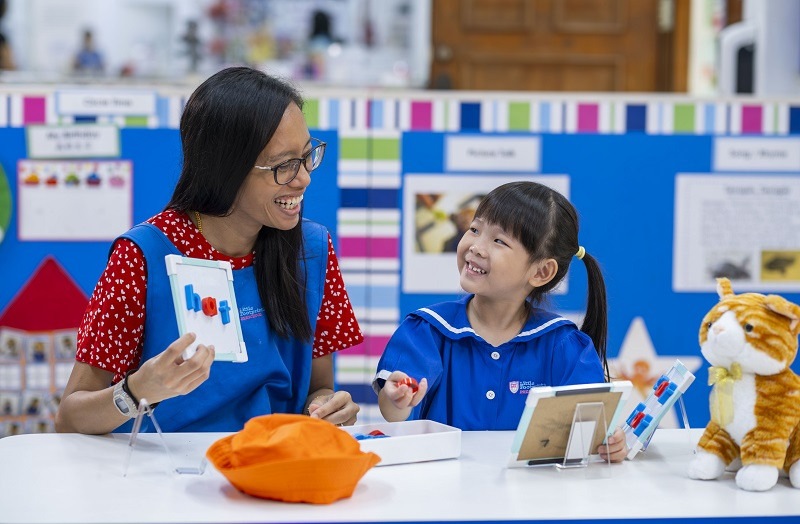
Does ‘phonics’ seem like a trending enrichment programme for children? If you’re looking out for a suitable childcare centre in Singapore to send your child to, chances are, learning phonics is part of the curriculum.
What is phonics and why is it important for young children to master this learning skill?
Phonics is a systematic method used to teach children how to read. It connects the relationship between the letters of the English alphabet and the sounds of the spoken language. Learning phonics evidently contributes to their literacy development milestones which includes speech, writing and cognitive development too.

How does learning phonics benefit young children?
Several decades ago, most of us probably neither heard of terms like phonetic sounds nor the concept of phonics when we were preschoolers. This might have made deciphering complicated-looking words more challenging, and now, educators are working to ease this.
What is the importance of phonics in early childhood?
These days, phonics is gaining popularity, thanks to its scientific-based literacy methods that have proven to raise competent readers with a strong acquisition of the English language. By mastering letter-sound skills, children sharpen their literacy skills through the preschool years.
This helps prepare them for the transition to Primary One as they learn how to decode words, read fluently, spell accurately and communicate with good comprehension abilities.
Is there an ideal age to teach children phonics?
Research found that children between the ages of 2 and 5 are particularly able to capture and repeat speech sounds of a language. This age range coincides with children’s key literacy development milestones – the awareness exploration stage.
Furthermore, the early years are also when children absorb what they see and hear like sponges. Picking up new words is part of their journey! This is the best time to teach them phonics.
Hence, children’s reading programmes are often tailored to this age group, whether at childcare centres or enrichment classes.
Fun activities to reinforce phonics learning for children
Like many things they are exposed to, phonics is completely new to them. To support their learning, consistency is key. That said, every child learns at their own pace. It is important for parents to understand this, and to be patient with both their child and yourself.

Here are some ideas on how you can support your child’s phonics progress:
1. Read to them regularly
Make time to read books to your little ones – this could be in the mornings or as a bedtime story.
2. Practice the phonetic sounds and say/sing it together
Start by learning basic phonic rules and how they sound. If unsure, parents can watch videos and practise before teaching kids. There are catchy phonics songs to sing along too!
3. Play games to reinforce learning of phonetic sounds
“Can you bring me some items that start with the /t/ sound?” Let your little one go on a treasure hunt as his visual-aural skills are activated for some fun!
4. Say, play and string words
Practise blending simple words like ‘cat’ which has the three sounds: /c/ /a/ and /t/. Using toys like letter cubes or letter magnets, get your child to pick out those letters and put them together. This lets you know if your child can recognise letter sounds and be able to recognise a word. Watch as he/she beams with confidence whenever they do it!
5. Play word hunt
On a piece of paper, write down different words. Ask your child, “Can you circle the words with different coloured markers or crayons that start with /p/?” Repeat using different letters and words. Move on to digraphs and diphthongs when your child is ready.
Learning phonics from the childcare level in Singapore
As part of Little Footprints Preschool’s 360 ° approach to language and literacy, a phonics component is integrated into our curriculum to nurture early learners.
With our theme-based literacy methods built into our core programme, we support children’s development in reading and communicating at various ages. Through daily lessons and multiple experiential learning touchpoints, they are exposed to systematic phonics instructions that pave the way for raising confident readers and communicators.
Find out how our childcare programme can support your children’s development. Book a centre tour at your preferred centre to visit the school.
Follow us on social media to stay updated on our latest updates and happenings:




